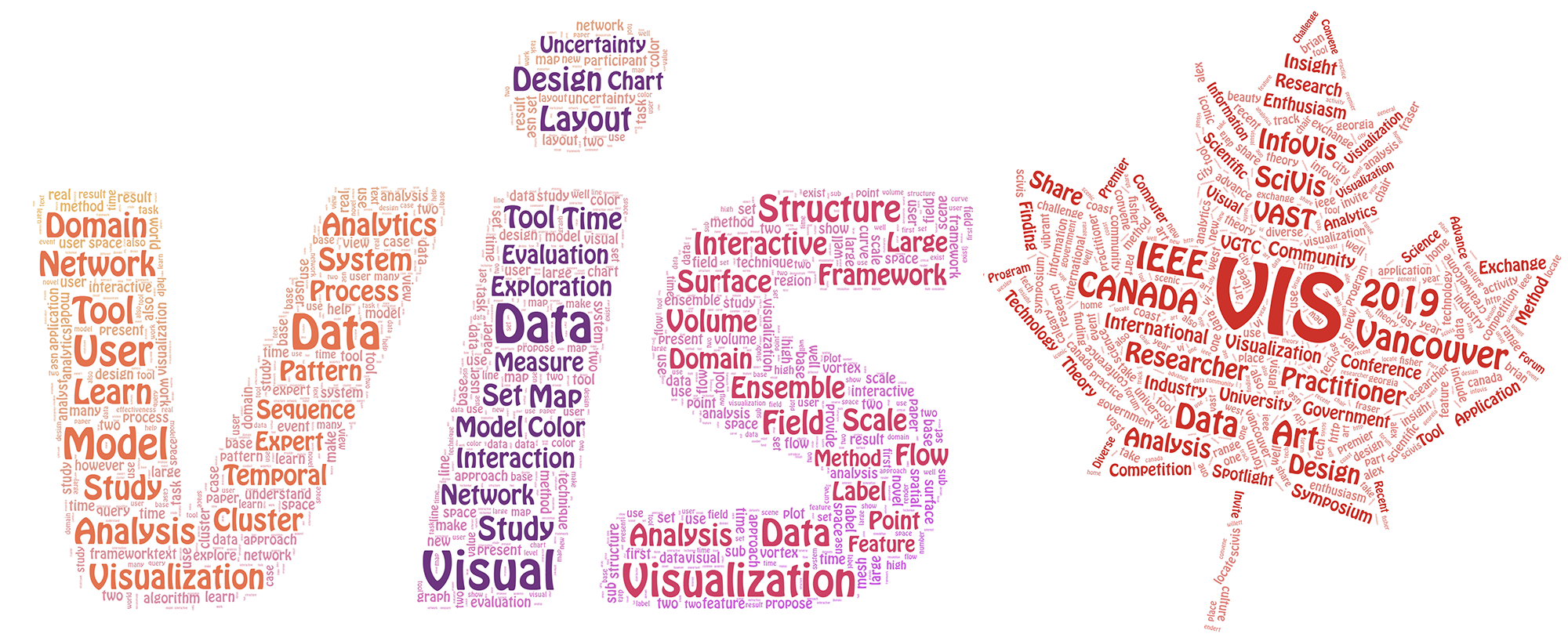ShapeWordle: Tailoring Wordles using Shape-aware Archimedean Spirals
IEEE Transactions on Visualization and Computer Graphics (Proc. InfoVis 2019), 2019

Figure 1: Results produced by our ShapeWordle: (left) using the abstracts of VAST, InfoVis, and SciVis papers of IEEE VIS 2018 to fill an expressive shape of “VIS” and (right) words of the call for papers of IEEE VIS 2019 filled in the shape of the Canadian Maple Leaf.
Abstract:
We present a new technique to enable the creation of shape-bounded Wordles, we call ShapeWordle, in which we fit words to form a given shape. To guide word placement within a shape, we extend the traditional Archimedean spirals to be shape-aware by formulating the spirals in a differential form using the distance field of the shape. To handle non-convex shapes, we introduce a multi-centric Wordle layout method that segments the shape into parts for our shape-aware spirals to adaptively fill the space and generate word placements. In addition, we offer a set of editing interactions to facilitate the creation of semantically-meaningful Wordles. Lastly, we present three evaluations: a comprehensive comparison of our results against the state-of-the-art technique (WordArt), case studies with 14 users, and a gallery to showcase the coverage of our technique.Video:
Download MP4[25M]
System: www.shapewordle.com
Materials:
Paper: [PDF 28.7M].
Supp: [PDF 157M].

Figure 2: Pipeline of our approach. (a) The input consists of a set of words with weight values and a shape; (b) the shape is segmented into different parts; (c) an initial Wordle filled up the given shape; (d) the layout of the important words in the editing mode; (e) the result generated after manipulating individual important words; (f) the result generated by filling the marginal words into the layout in (e) and if the further editing is required, user enters the editing model and the layout becomes the one shown in (e).
Figure 3:Results designed by the participants in our case studies. (a) the Wikipedia page of Google Chrome [40]; (b) The speech “Towards a Strategy of Peace” by the former U.S. President John F. Kennedy; (c) the speech “We shall fight on the beaches” by the British politician Winston Churchill; (d) the novel “Alice’s Adventures in Wonderland”; and (e) prince, rose, and fox from the novel “Little Prince.”
Acknowledgements:
This work is supported by the grants of the National Key Research & Development Plan of China (2016YFB1001404), NSFC (61772315, 61861136012), the Leading Talents of Guangdong Program (00201509), the CAS grant (GJHZ1862), the DFG Center of Excellence 2117 “Centre for the advanced Study of Collective Behaviour” (ID: 422037984), DFG Project 493/19 “Perception-based Information Visualization,” and the Research Grants Council of the Hong Kong Special Administrative Region (Project no. CUHK 14203416).